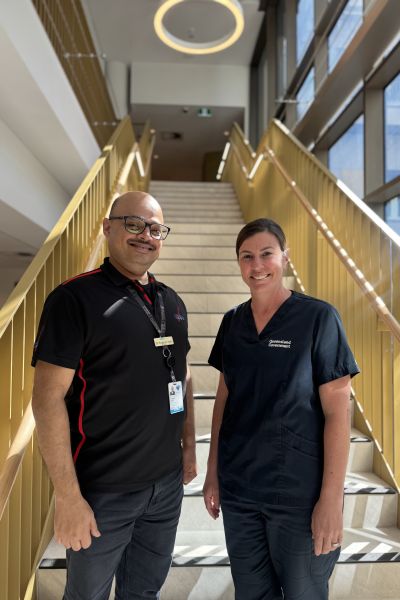Caboolture-led trial challenges long-held beliefs about vasopressor delivery in critically ill patients

Dr Yogesh Apte and Nurse Research Coordinator Stacey Watts are testing how vasopressor infusions may be delivered.
A Caboolture-based feasibility study is reshaping how vasopressor infusions may be delivered, paving the way for a future multi-centre trial that could change global clinical practice.

Dr Yogesh Apte and Nurse Research Coordinator Stacey Watts are testing how vasopressor infusions may be delivered.
The Vasopressor Infusion via Peripheral versus Central Access in patients with shock (VIPCA) randomised controlled trial is being led by clinicians at Caboolture Hospital in partnership with the University of Queensland (UQ), Griffith University and University of Sunshine Coast (UniSC) researchers.
It is one of the first studies in Australia to assess the safety and feasibility of delivering vasopressor medications via peripheral intravenous cannulas (PIVCs) rather than central venous catheters (CVCs).
Funded by the Emergency Medicine Foundation, TPCH Foundation and UQ, the VIPCA trial brought together clinicians across departments — a true collaboration between intensive care and ED teams.
“Vasopressors have traditionally been delivered through central lines due to concerns over tissue injury, but this practice hasn’t been supported by strong evidence,” said Dr Yogesh Apte, Caboolture ICU Senior Staff Specialist and principal investigator.
“Our study tested the feasibility of implementing a trial protocol comparing early versus delayed CVC insertion for vasopressor delivery — and the findings are very encouraging.”
Key features of the VIPCA trial are:
- single centre, randomised controlled feasibility study
- 40 patients enrolled (20 per group)
- two strategies: early CVC versus late CVC insertion
- high protocol adherence in the late CVC group
- low complication rates for both PIVC and CVC groups
- excellent follow-up and data retention rates.
Emergency Physician and study co-investigator Dr Thomas Holland said the study demonstrated that a full-scale, multi-centre RCT was feasible with some refinements.
“It also raised important questions about clinical decision-making around CVC timing,” Dr Holland said.
The research team noted that slower-than-anticipated recruitment reinforced the need for broader participation across multiple hospitals. Importantly, the safety profile of peripheral administration was promising — with comparable outcomes between both trial groups and minimal complications.
UniSC researcher and ED conjoint Associate Professor Alison Craswell said VIPCA had started the critical conversation about whether central lines were always necessary.
“A larger trial could give us definitive answers and potentially lead to less invasive care for patients with shock,” Assoc Prof Craswell said.
A subsequent study of the results of the trial is planned to look at the economic benefits of the strategy.
Next steps include refining the protocol and engaging multi-centre partners to launch a full-scale trial focused on clinical outcomes and long-term impacts.
